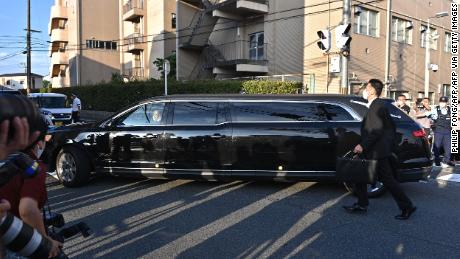As Japan mourns, observers say an additional wave of support could swell what was already expected to be a comfortable victory for Abe’s party in Sunday’s upper house election.
“We must absolutely defend free and fair elections, which are the basis of democracy. We will continue our electoral campaign as planned with the firm conviction that we will never give in to violence,” Kishida said on Friday.
Polling stations opened at 7 a.m. Sunday morning local time and will close at most of the 46,017 stations by 8 p.m. local time. More than 125 seats are in contention for 545 candidates.
Murder suspect speaks
Yamagami told investigators he originally intended to kill Abe using explosives at an event in Okayama, a prefecture three hours’ drive from Nara, Japanese state broadcaster NHK reported on Sunday. .
“I was thinking of killing the former prime minister (Okayama) there, but I saw that there were admission procedures at the entrance and I felt that it would be difficult to enter,” said Yamagami to investigators, according to NHK.
Yamagami was taken to the Nara District Attorney’s Office on Sunday morning.
Nara Prefectural Police told CNN on Saturday that surveillance cameras showed the suspect leaving Yamato-Saidaiji Station in Nara on Friday after boarding the train and heading towards the Abe event.
The murder has raised questions about the level of security given to Abe.
Nara Police Chief Tomoaki Onizuka said Saturday that he “can’t deny that there have been issues” with Abe’s safety, and that he “takes[s] responsibility” for failure.
“After the first report of the incident came in…it was the height of guilt and regret I have felt in my 27 years in law enforcement,” an emotional Onizuka said.
“I feel the weight of my responsibility.”
Current elections
Campaigning was suspended on Friday following Abe’s murder, but politicians resumed pre-election activities on Saturday.
While the upper house is the less powerful of the two houses in Japan’s parliament – and can be supplanted by the lower house on vital issues – a good performance by the LDP could help Kishida push through a program that includes increased defense spending. and possibly a revised pacifist Constitution of Japan. Both of these causes had been championed by Abe before his death.
“The ruling LDP-Komeito coalition was already on course for a solid victory,” James Brady of consultancy Teneo said in a note published by Reuters. “A flurry of sympathy votes now could increase the margin of victory.”
Brady added that in the coming months the government is “certain to seek to strengthen homeland security.”
Polls taken before Abe’s death had predicted the LDP would win at least 60 of the 125 seats contested on Sunday, up from the 55 it currently holds, Reuters reported, allowing it to retain the majority it holds with its partner. junior of the Komeito coalition.
Reaching 69 seats in the upper house would give the LDP a majority, a threshold that had been seen as a stretch before Abe’s murder, and possibly bolster its ability to advance its agenda, Reuters reported.
A world in mourning
Since Abe’s death, mourners in Japan have gathered and laid flowers at a makeshift memorial outside Yamato-Saidaiji Station in Nara, near where the former leader was beaten down.
Presidents, prime ministers and other international leaders have sent tributes expressing their outrage and sadness at the killing.
The US State Department said on Saturday that Secretary of State Antony Blinken would travel to Tokyo on Monday to pay tribute to the Japanese people.
State Department spokesman Ned Price said Blinken would also meet with senior Japanese officials, adding that “the U.S.-Japan alliance is the cornerstone of peace and stability in the Indo-Pacific. and has never been so strong”.
Abe’s funeral will be Monday and Tuesday, his office told CNN, with a wake Monday to be followed by a memorial service Tuesday.
The funeral will be hosted by his widow Akie Abe at a temple in Tokyo and attendance will be limited to family members and people close to the former prime minister, Japanese public broadcaster NHK reported.
CNN’s Chie Kobayashi, Pierre Meilhan and Larry Register contributed to this report

